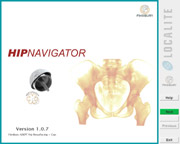
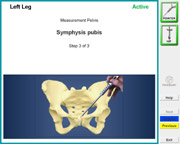
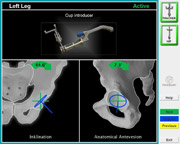
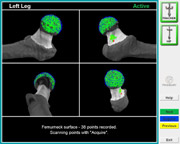
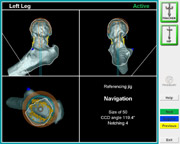
The HipNavigator is a CT-less navigation system for hip replacement. Total hip prosthesis consists of several components for which separate navigation may be desirable. Owing to its modular design, the LOCALITE HipNavigator can individually support navigation for replacing hip cup and stem or for femur head resurfacing.
Main Problems in Hip Arthroplasty
Optimal
hip cup replacement depends on the correct inclination and anteversion
of the implant. The literature provides guidance on the optimal
orientation of the hip cup in the acetabulum. Studies show that significant deviation
from these guidelines, or a patient's anomalous anatomy, may lead to
luxation of the hip.
Correspondingly, antetorsion and varus-valgus
of the femur must be adjusted correctly. A particular problem here is
to reconstruct the length of the leg.
In femur head resurfacing, notching must be avoided. At the same time,
the surgeon aims to achieve load transmission in the largest possible
CCD angle – conflicting demands hard to reconcile.
Incidents of
malpractice in these areas may make corrective operations necessary;
they lead to premature failure of the implant due to abrasion,
loosening or luxation. Computer-based navigation support for the
surgeon significantly reduces the risk of mal-positioning implants and
thus improves the long-term results of hip arthroplasty.
CT-less Navigation Without Preoperative Planning
The
data needed in the navigation are acquired intraoperatively by
locating anatomical landmarks and by scanning the corticalis, using
different, novel methods in the three navigation modules. Thus extra
radiation exposure through preoperative CTs or intraoperative
radioscopy can be avoided or minimized. Working with the LOCALITE
HipNavigator, the surgeon can reduce time-consuming preoperative
planning, freeing time for improved patient care.
Navigation for Hip Cup Replacement
In
a hip cup arthroplasty without navigation support, to guide the
acetabulum reamer and the cup introducer, the surgeon needs to
determine exactly how the patient is lying on the operating table. As
misjudgments here may lead to incorrectly positioning the implant,
the quality of the surgery depends largely on the surgeon's level of
expertise.
To use navigation support, the surgeon needs to acquire position data
for a few anatomical landmarks. From these data the navigation system
determines the optimal inclination and anteversion, taking into account
hints from the surgeon about the patient's anatomy. Regardless of the
typical variations in the patient's position on the operating table, the
navigation system helps the surgeon to guide the reamer and the cup
introducer at the angle needed to correctly position the
implant.
Navigation for Femur Head Resurfacing
Navigation
for femur head resurfacing is based on precise scans of spots or areas
of the relevant corticalis. Calculations based on these scan data are
presented in a way that allows the surgeon to assess the situation very
accurately. A specific navigation scene helps the surgeon to align the
implant to the patient's anatomy.
Independent of Makes of Prostheses
The LOCALITE HipNavigator provides an open platform that can be used
with any make of hip endoprostheses. Thus the surgeon can select,
even mix and match, the best-suited implant for the case at hand,
without any restrictions from the navigation system. Hospitals where
different makes of prostheses are routinely used need just one
navigation system: LOCALITE HipNavigator.